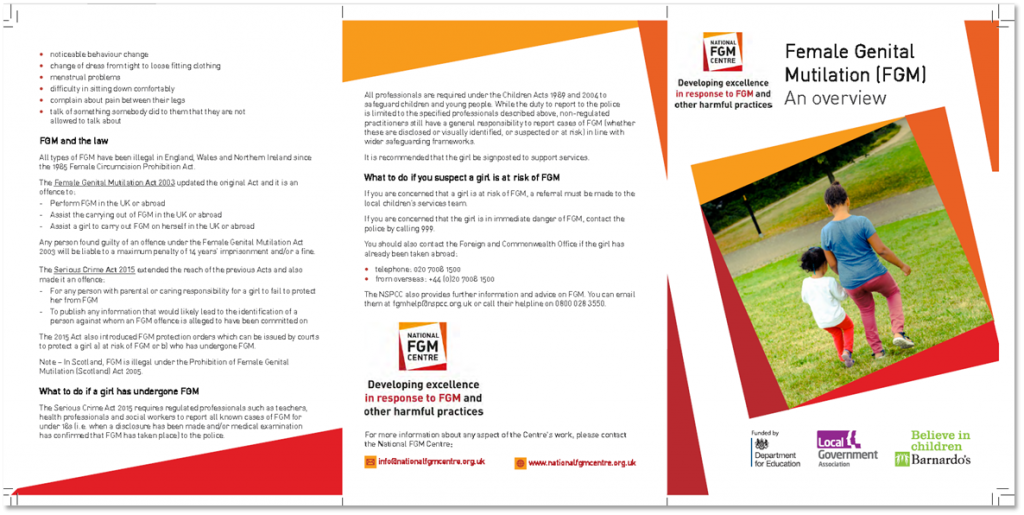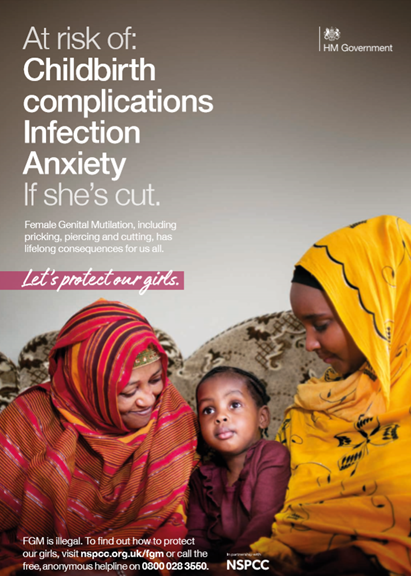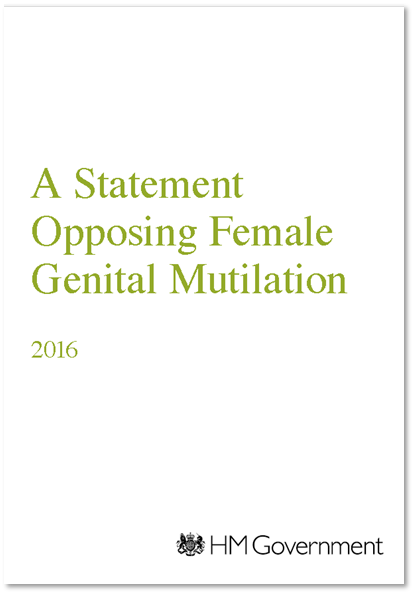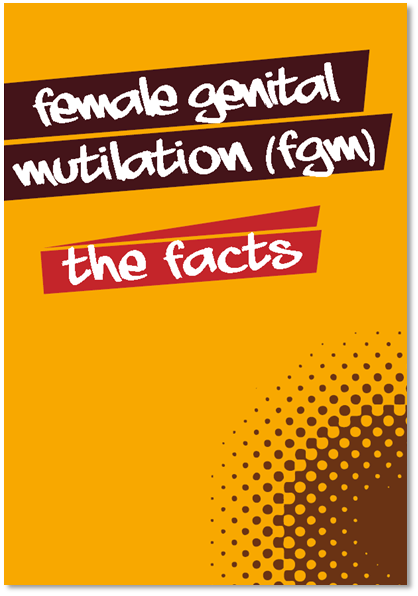Harmful Practices
What is meant by Harmful Practices?
Harmful traditional practices are forms of violence which have been committed, primarily against women and girls, in certain communities and societies for so long that they are considered, or presented by perpetrators, as part of accepted cultural practice. They have often been embedded in communities for a long time and are born out of community pressure.
The most common forms of Harmful Practices are
- forced or early marriage
- so called ‘honour’ based violence
- female genital mutilation or cutting (FGM).
Other less common forms include:
- Spirit Possession
- Son preference
- Bride kidnapping
- Acid Attacks
- Breast Ironing
Forced Marriage and Honour Based Violence
Arranged Marriage
In arranged marriages, the families of both spouses take a leading role in arranging the marriage but the choice of whether or not to accept the arrangement remains with the prospective spouses.
Forced Marriage
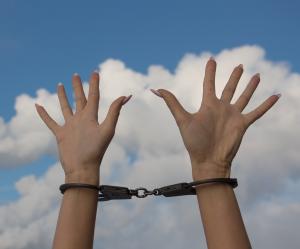
This is significantly different to an arranged marriage.
A forced marriage is where one or both people do not (or in cases of people with learning disabilities or reduced capacity, cannot) consent to the marriage but they are pressurised, or forced to do so. It is recognised in the UK as a form of domestic or child abuse and a serious abuse of human rights. However unlike ‘typical’ domestic abuse, family members and the extended family are often involved.
The types of abuse used to make someone marry against their will include:
- physical – for example, threats, physical violence or sexual violence
- emotional and psychological – for example, making someone feel like they are bringing ‘shame’ on their family
- Financial abuse, for example taking someone’s wages.
Reasons for performing forced marriages include: strengthening extended family links; controlling unwanted behavior and sexuality; preventing ‘unsuitable’ relationships; protecting and abiding by perceived cultural or religious norms; keeping the wealth in the extended family; dealing with the consequences of pregnancy out of wedlock; considering the contracting of a marriage as the duty of the parents; obtaining a guarantee against poverty; aiding immigration.
Honour Based Violence

So called ‘honour’ based violence (HBV) is where the person is being punished by their family or their community. They are being punished because of a belief, actual or alleged, that a person has not been properly controlled enough to conformity and thus this is to the ‘shame’ or ‘dishonour’ of the family.
‘Honour Based Violence’ is a crime or incident, which has or may have been committed to protect or defend the honour of the family and/or community members (ACPO 2007).
Breast Ironing
Breast ironing or breast flattening, a practice of using hard or heated objects to suppress or reverse the growth of breasts, is a recognised form of child abuse.
Breast flattening is traditional practice in parts of West Africa. It is typically arranged or performed by a girl’s mother, to make the girl less attractive to males by delaying the signs that the girl is maturing into a young woman. Reasons for this include, protecting the girl from sexual harassment and rape. It also carried out to discourage pre-marital sex, unwanted pregnancy and prevent early marriage. Often one of the drivers is that the mother will want her daughter to avoid pregnancy so that they receive an education.
Legislation on Forced Marriage
The Anti-social Behaviour, Crime and Policing Act 2014 made it a criminal offence in England, Wales and Scotland to force someone to marry.
This includes:
- taking someone overseas to force them to marry (whether or not the forced marriage takes place)
- marrying someone who lacks the mental capacity to consent to the marriage (whether they are pressured to or not)
It is also possible for victims or those at risk to apply for a Forced Marriage Protection Order (FMPO). As a civil law measure, an application for a FMPO would be made in the family court.
In 2017 the government introduced lifelong anonymity for victims of forced marriage to encourage more victims of this hidden crime to come forward.
What to do if you’re worried about a child
All practitioners working with victims of forced marriage and HBV need to be aware of the ‘one chance’ rule. That is, they may only have one chance to speak to a potential victim and may only have one chance to save a life. All practitioners working within statutory agencies need to be aware of their responsibilities and obligations when they become aware of potential forced marriage/ HBV cases. If the victim is allowed to walk out the door without support being offered, that one chance might be wasted.
It is important to remember that in these instances family members, friends and the community may pose the biggest risk to the victim.
Do Not:
- Attempt to mediate,
- Send the victim away without having taken appropriate action,
- Approach family members and/or members of the community without an express request from the victim
- Breach confidentiality or share information inappropriately, unless due to safeguarding concerns for a child or vulnerable adult
Resources
- If you feel that a child is in immediate danger: dial 999.
Merseyside Honour Based Violence and Forced Marriage Protocol
https://www.virtual-college.co.uk/resources/free-courses/awareness-of-forced-marriage
Female Genital Mutilation
What is FGM?
Female Genital Mutilation (sometimes known as cutting) comprises all procedures that involve partial or total removal of the external female genitalia, or other injury to the female genital organs for non-medical reasons. FGM is internationally recognized as a violation of the human rights of girls and women. (Source: WHO)
Across 28 countries in Africa and the Middle East, over 200 million women and girls have been subjected to some form of genital mutilation.
Statistics show that around 65,790 women and girls in the UK who are victims of FGM
Also see the Merseyside FGM Protocol
What does the law say about FGM?
FGM is illegal in the UK and has been a criminal offence since 1985. The Female Genital Mutilation Act 2003 strengthened existing law to make it an offence to arrange for a child to be taken abroad for FGM, and for UK nationals or permanent UK residents to abet, counsel, procure or undertake FGM abroad, even in countries where the practice is legal.
The Serious Crime Act 2015 (guide) extends this protection to girls under the age of 18 who are ‘habitually resident’ (or on short temporary stays) such as students and refugees. The Serious Crime Act also creates a new offence of failing to protect a girl from FGM. If an offence of FGM is committed against a girl under the age of 16, each person who is responsible for the girl at the time the FGM occurred will be liable under this new offence.
The 2015 Act also enables the high court or family courts to make a FGM Protection Order for individuals who are victims or at risk of FGM (similar to forced marriage protection orders). Victims or those at risk, or relevant third parties (including local authorities) can apply for the orders which set restrictions to protect an individual.
Ending FGM, Government Campaign Video:
What to do if you’re worried about a child
There are three circumstances relating to FGM which require identification and intervention:
- Where someone is at risk of FGM:
- Where someone has undergone FGM;
- Where a prospective mother has undergone FGM.
Professionals and volunteers in most agencies have little or no experience of dealing with FGM. Encountering FGM for the first time can cause people to feel shocked, upset, helpless and unsure of how to respond appropriately to ensure that a child, and/or a mother/any female adult, is protected from harm or further harm.
FGM is a form of child abuse and violence against women and girls, and therefore should be dealt with as part of existing child and adult protection structures, policies and procedures.
If you feel that a child is in immediate danger: dial 999.
Resources
Link to HM Government Resources
-available in several languages.
HM Government Posters:
Statement in other languages:
Female Genital Mutilation – Guidance
Female Genital Mutilation Multi-agency Protocol
The Home Office has launched free online training produced by the virtual college.
It can be accessed at https://www.FGMelearning.co.uk/
This course is useful for anyone who is interested in gaining an overview of FGM, particularly frontline staff in healthcare, police, border force and children’s social care.
Healthcare professionals can also access free online training at http://www.e-lfh.org.uk/home/
Spirit Possession
What is spirit possession?
The belief in “possession or “witchcraft” is widespread. It is not confined to particular countries, cultures or religions, nor is it confined to new immigrant communities in this country.
The definition, which is commonly accepted across faith-based organisations, non-governmental organisations and the public sector, is the term ‘possession by evil spirits’ or ‘witchcraft’.
The number of known cases of child abuse linked to accusations of “possession” or “witchcraft” is small, but children involved can suffer damage to their physical and mental health, their capacity to learn, their ability to form relationships and to their self-esteem.
Such abuse generally occurs when a carer views a child as being “different”, attributes this difference to the child being “possessed” or involved in “witchcraft” and attempts to exorcise him or her.
A child could be viewed as “different” for a variety of reasons such as, disobedience; independence; bed-wetting; nightmares; illness; or disability. There is often a weak bond of attachment between the carer and the child.
There are various social reasons that make a child more vulnerable to an accusation of “possession” or “witchcraft”. These include family stress and/or a change in the family structure.
The attempt to “exorcise” may involve severe beating, burning, starvation, cutting or stabbing and isolation, and usually occurs in the household where the child lives.
Any siblings or other children in the household may be well cared for with all their needs met by the parents and carers. The other children may have been drawn in by the adults to view the child as “different” and may have been encouraged to participate in the adult activities.
Concerns
Concerns reported in the cases known from research usually involve children aged 2 to 14, both boys and girls, and have generally been reported through schools or non-governmental organisations. The referrals usually take place at a point when the situation has escalated and become visible outside the family.
Note: This means that the child may have been subjected to serious harm for a period of time already.
The initial concerns referred have been about:
- Issues of neglect, such as not being fed properly or being ‘fasted’, not being clothed, washed properly etc. but left to fend for themselves especially compared to the other children in the household;
- Often the carer is not the natural parent and the family structure can be complex;
- Children often appear distressed and withdrawn;
- The child is seen as the scapegoat for a change in family circumstances for the worse;
- In a group of children it may be the child who is relatively powerless vis-a-vis the parents/carers, maybe a child with no essential role in the family;
- The child is seen as someone who violates the family norms by being physically different perhaps because of illness, disability or, in some cases, a suspicion by the father of adultery by the mother.
All agencies should be alert to the indicators above and should be able to identify children at risk of this type of abuse and intervene to prevent it by using the procedures for Referrals, Social Work Assessment of Needs and Strengths and, when appropriate, Strategy Discussions/Meetings.
Assessments
All referrals must be responded by Children’s Specialist Services with a thorough Social Work Assessment of Needs and Strengths and, depending on the seriousness of the referral information, a Strategy Discussion which takes into account the dimension of the beliefs expressed by the child and family. The assessment must involve the particular faith group or person performing or advising the family about the child in order to establish the facts i.e. what is happening to the child.
A discussion should take place with the Safeguarding Unit in all cases where there are accusations of ‘possession’ or ‘witchcraft’.
Careful assessment at all stages is needed with close communications, which include key people in the community especially when working with new immigrant communities and with all the various faith groups, are essential.
In view of the nature of the risks, a full health assessment of the child should take place to establish the overall health of the child, the medical history and current circumstances.
Any suggestions that the parent or carers will take the child out of the country must be taken seriously and legal advice sought regarding possible prevention. See also Pan Merseyside Missing From Home multi-agency protocol.
The child must be seen and spoken to on his or her own. The child’s bedroom or sleeping arrangements must be inspected.
Although the research has found a number of parents and carers to have some form of mental health problem, this must not distract from the child’s situation nor be seen as a factor to explain away the potential risks to the child.
In assessing the risks to the child, the siblings or any other children in the household must also be considered as they may have witnessed or been forced to participate in abusive or frightening activities.
Further contacts for advice can be found from the local representatives for some faiths, from organisations such as the Churches’ Child Protection Advisory Service (CCPAS) who provide information about exorcism; the African Caribbean Evangelical Alliance (ACEA); Churches Together in England and the Muslim Parliament, all of whom are consulting about and developing guidance.
The Local Authority Safeguarding Unit will collate information and keep the LSCB updated when necessary so that liaison and communication with local faith groups can be monitored and developed.
Further support
If you are worried about a child:
Integrated Front Door: 0151 606 2008
For further support and advice regarding issues around Harmful Practices:
Savera UK – 0800 107 0726
Savera UK help people experiencing domestic abuse, or who are at risk of forced marriage, honour killing or female genital mutilation.
Karma Nirvana – 0800 599 9247
Karma Nirvana have been supporting victims of honour crimes and forced marriages since 1993. Lines are open between 9.30 am – 5.00 pm.
Home Office Forced Marriage Unit – 0207 008 0151
Freedom Charity – 0845 607 0133
Charity for children and young people who are at risk or subject to honour based crimes/ forced marriages.
Childline – 0800 1111
NSPCC – 0808 800 500

